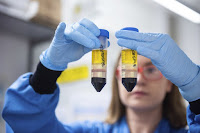Vaccine
Vaccine
Introduction
Vaccine is a Medical term word. It is like a medicine for a disease. Vaccine is a word is consecutively repeated in 2020. So, we will see about what is Vaccine and its types.
Vaccine
A vaccine is a biological preparation that provides active acquired immunity to a particular infectious disease. A vaccine typically contains an agent that resembles a disease-causing microorganism and is often made from weakened or killed forms of the microbe, its toxins, or one of its surface proteins.
Vaccination
The administration of vaccines is called vaccination. Vaccination is the most effective method of preventing infectious diseases; widespread immunity due to vaccination is largely responsible for the worldwide eradication of smallpox and the restriction of diseases such as polio, measles, and tetanus from much of the world. The World Health Organization (WHO) reports that licensed vaccines are currently available for twenty-five different preventable infections.
Effects
There is overwhelming scientific consensus that vaccines are a very safe and effective way to fight and eradicate infectious diseases. The immune system recognizes vaccine agents as foreign, destroys themand "remembers" them. When the virulent version of an agent is encountered, the body recognizes the protein coat on the virus, and thus is prepared to respond, by first neutralizing the target agent before it can enter cells, and secondly by recognizing and destroying infected cells before that agent can multiply to vast numbers.
Efficiency of Vaccines
The efficacy or performance of the vaccine is dependent on a number of factors:
✓ The disease itself (for some diseases vaccination performs better than for others)
✓ The strain of vaccine (some vaccines are specific to, or at least most effective against, particular strains of the disease)
✓ Whether the vaccination schedule has been properly observed.
✓ Idiosyncratic response to vaccination; some individuals are "non-responders" to certain vaccines, meaning that they do not generate antibodies even after being vaccinated correctly.
✓ Assorted factors such as ethnicity, age, or genetic predisposition.
Types of Vaccines
Vaccines contain dead or inactivated organisms or purified products derived from them. There are several types of vaccines in use. These represent different strategies used to try to reduce the risk of illness while retaining the ability to induce a beneficial immune response.
❖ Inactivated
✓ Some vaccines contain inactivated, but previously virulent, micro-organisms that have been destroyed with chemicals, heat, or radiation.
❖ Attenuated
✓ Some vaccines contain live, attenuated microorganisms. Many of these are active viruses that have been cultivated under conditions that disable their virulent properties, or that use closely related but less dangerous organisms to produce a broad immune response.
✓ Although most attenuated vaccines are viral, some are bacterial in nature.
❖ Toxoid
✓ Toxoid vaccines are made from inactivated toxic compounds that cause illness rather than the micro-organism.
❖ Subunit
✓ Rather than introducing an inactivated or attenuated micro-organism to an immune system, a subunit vaccine uses a fragment of it to create an immune response.
❖ Conjugate
✓ Certain bacteria have polysaccharide outer coats that are poorly immunogenic. By linking these outer coats to proteins (e.g., toxins), the immune system can be led to recognize the polysaccharide as if it were a protein antigen. This approach is used in the Haemophilus influenzae type B vaccine.
❖ Heterotypic
✓ These are vaccines that are pathogens of other animals that either do not cause disease or cause mild disease in the organism being treated.
❖ Valence
✓ Vaccines may be monovalent (also called univalent) or multivalent (also called polyvalent).
✓ A monovalent vaccine is designed to immunize against a single antigen or single microorganism.
✓ A multivalent or polyvalent vaccine is designed to immunize against two or more strains of the same microorganism, or against two or more microorganisms.
Conclusion
These are the types of vaccine. Vaccine is very essential and important for all the people. So, don’t do any business in vaccine distribution.






Comments
Post a Comment